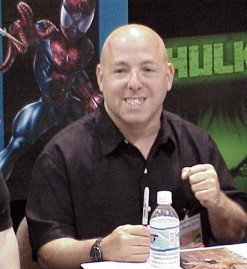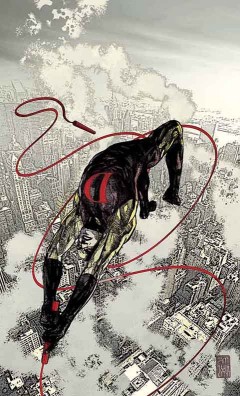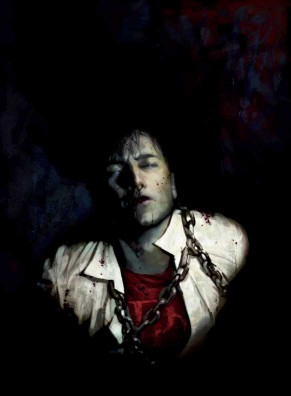|
An
Interview with Brian Michael Bendis, part 1
Daredevil's "Golden Age"
I had a long introduction prepared
about how long Brian Michael Bendis and I have been doing
e-mail dances, phone tag, and convention appearance promises
to get this interview. But now that it's done? All that really
matters is that, yes, Fanboy Planet has finally scored an
interview with Bendis.
We spoke last week late at night, for the hottest writer
in comicdom might just also be a vampire, working best after
midnight. Never mind that that's most likely when his infant
daughter is sleeping; our version is better. Because this
interview had been several years in the promising, we determined
to make it a big blow-out - starting with some talk about
a project that hasn't gotten nearly as much attention in
the shadow of The Avengers.
Just to remind you fans, the reason everybody jumped on
the Bendis bandwagon in the first place was because of his
work on Daredevil, a character celebrating its fortieth
anniversary this week with the release of Daredevil #65.
So in today's installment of our interview, we're talking
about The Man Without Fear, as written by The Man Without
Sleep…
Fanboy
Planet: What inspired you to do "The Golden
Age?"
Brian Michael Bendis: I've actually
been working on this story idea for years, probably as long
as I've been working on Daredevil. There's two premises
that were separate. One of which was the idea of telling
a story that takes place in the Golden Age, the Silver Age
and Modern Age of Marvel, all at the same time. It's very
much based on Once Upon a Time in America, if you've
ever seen that Sergio Leone movie, where you're pretty much
seeing DeNiro's story from three different generations.
It's a fascinating storytelling device. It's been done other
places, of course, but this is what inspired me.
Knowing everything I know about organized
crime, having studied it for so many years, I became aware
that there would be an arc of organized crime that happened
before Wilson Fisk. It couldn't just be Wilson Fisk.
Or let's say he birthed himself out of
Lucky Luciano or Bugsy Siegel. There would still be people
in between those two that would be just as interesting,
if not more interesting. And then there's the Fixer, who
was with Daredevil in the origin, and you start putting
a tapestry together of organized crime within the Marvel
Universe. And in those years you add a chapter.
| |
| Daredevil
#66:
Did anybody tell Murdock the colors just don't go? |
Fanboy
Planet: Are you going to sneak in a nod to the
1940's Daredevil?
Bendis: He's actually not a Marvel
character. That would have been awesome. There will be golden
age heroes that Marvel does own that will be appearing in
the story. I don't want to ruin who, but there's a couple
of guest-stars, one of whom people might have to look up
on the internet to see who it actually is. We are going
to see a couple of good ones.
It's one person's story, this new kingpin,
about how superheroes have affected his rise and fall as
a kingpin. He made his name fighting superheroes and he
lost his name fighting superheroes.
Fanboy
Planet: You've got a lot of guest artists coming
in for this one…
Bendis: The guest artists are just
coming in only for issue 65, which is a prelude to that
story. Issue 65 is about how Daredevil's outing has affected
the rest of the Marvel Universe. It's a tapestry of short
stories illustrated by people like Greg Horn, P. Craig Russell,
Michael Golden - people I never thought I'd get to work
with. Each of them tell a story from someone's point of
view, all of it having to do with Daredevil and it leads
into "who was the kingpin before The Kingpin?"
But in The Golden Age story itself, Alex
Maleev is drawing the three different time periods in three
different art styles, and they're being colored in
three different art styles. Dave Stewart picked out a different
coloring style for each one. It's stunning to look at.
Fanboy
Planet: So we'll see a wider range of Alex's
skills…
Bendis: Alex can do a million things.
It's just the language that he's built for Daredevil
has to stay consistent, but this is an opportunity for him
to get to try different things.
Fanboy
Planet: You used guest artists in Daredevil
#50, really utilizing them to make a point…
Bendis: It's funny. That was one
of those things where some people got it, some people didn't.
You know what I mean? Some people complained that it threw
them out of the story. Our point there was to illustrate
just how long this fight (between Daredevil and Kingpin)
had been going on.
Fanboy
Planet: So how can you top that?
Bendis: The Daredevil anniversary
is different in that in 50 we used artists that were classic
Daredevil artists, each and every one. This one is
people that have never drawn Daredevil before, both
young and classic.
It's along the lines of the Ultimate
Spider-Man super special we did a couple of years back,
with each artist telling a chapter and the story kind of
flowed together, each artist used very much on purpose.
The Avengers finale is like that, too. It's something
I love to do when it's appropriate. But it's only appropriate
for certain kinds of stories.
They're very hard to put together. It's
ten times the work for my editor. I'm having a good old
time, and she's doing tons and tons of paperwork. I'm getting
all the credit, and I'm not doing anything.
Fanboy
Planet: How long is The Golden Age arc lasting?
Bendis: It looks like it's five
or six issues. I keep fiddling with the end. It's one of
those things, since it takes place in so many different
time periods, it could end five different ways. I keep picking
at it.
Fanboy Planet: It will bring us
back to the point where we just left Daredevil, then?
Bendis:
Mm-hmm.
Fanboy
Planet: Do
you know where you're going from there?
Bendis: Mm-hmm.
Fanboy
Planet: …
Bendis: (laughs) After that
I'm going to do a thing called Decalogue, which I've
been promising for a long time. It's the Ten Commandments;
each story is a commandment. They're little vignettes and
short stories that tell a bigger, BIGGER story.
And the bigger story is "what was Daredevil
doing for that year when he became the Kingpin?" We skipped
over it; all of a sudden he was the Kingpin and it had been
a year. This is what happened then and how it really affected
Hell's Kitchen.
Fanboy
Planet: This leads into a question that has
been in the back of my mind. Frank Miller and Kevin Smith
both obviously dealt with Daredevil's Catholicism, so with
this Ten Commandments, is it fair to say that religion is
coming back?
Bendis: Religion is coming back.
I'm not going to shove it down anyone's throat. A little
goes a long way. The idea behind "The Decalogue" is my love
for the Polish filmmaker, Krzysztof Kieslowski. Good luck
spelling that.
He's
one of my heroes. I just love him tremendously, and I'd
found a book of scripts for his Decalogue (or Dekalog),
which he'd done in Poland about twenty years ago. In the
introduction, he discusses quite frankly that he wished
a bunch of other writers and artists would do the Ten Commandments
as a theme. He mentioned how he wasn't the first person
to think of this, and hoped that more people would do it.
I miss him a great deal, and I think it's
my way of A) getting my story across about Hell's Kitchen,
B) getting religion in but also being my valentine to him,
doing something that he wanted to have done.
We'll do two or three stories per issue,
but some stories may be one whole issue.
I've
been working on that for a long time; I haven't rushed it.
I announced it a while ago, but that was premature. Now
the stories are ready to go.
Look
for Daredevil #65 this week at your local comics shop. In
a few days, we'll have more
of this interview transcribed, talking about The Avengers...
|








